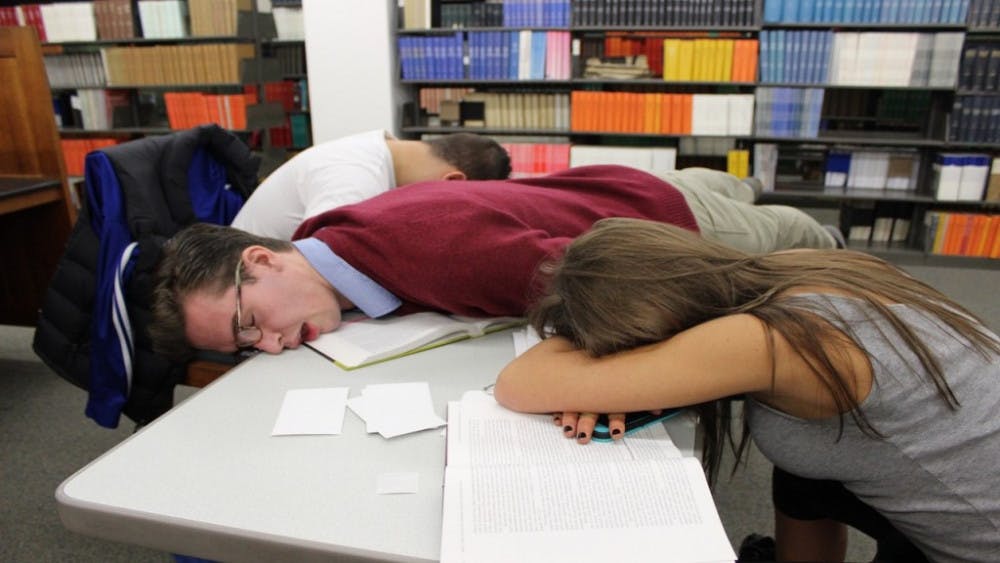College students have a lot of responsibilities. Trying to balance academic work, a social life and an internship or job can be stressful. It also is a main reason why many college students aren’t getting enough sleep.
The National Sleep Foundation recommends seven to nine hours of sleep for young adults ages 18 to 25. Many students, however, aren’t reaching this target. On average, most college students get 6 to 6.9 hours of sleep per night, according to the University of Georgia’s website.
[caption id="attachment_24030" align="aligncenter" width="838"] File photo[/caption]
College students are overwhelmed by work and other things they have to do, but sleep should be a top priority. Not getting enough sleep can negatively impact students.
Some of the consequences of not getting enough sleep are a lower GPA and poorer academic performance, and an increase in mental health issues like anxiety, according to the University of Georgia study. They also found that a lack of sleep can lead to weight gain and feeling more stressed.
It’s not always possible to get seven or eight hours of sleep in college. There are some times when you need to stay up all night finishing a project, typing up an essay or studying for an exam. We’ve all been there.
Try to avoid frequently pulling all-nighters, though. According to the Campus Mind Works website ad for the University of Michigan, research shows it’s more beneficial to get a good night of sleep than to stay up all night cramming.
The Centers for Disease Control and Prevention (CDC) has tips for getting better sleep. They advise making your bedroom “quiet, dark, relaxing, and at a comfortable temperature.” They also say that people should get rid of electronic devices from their bedroom, including smart phones, TVs and computers. That means resist the temptation to scroll through your social media feeds and be on your phone or laptop before bedtime because it will only make it more difficult to fall asleep.
Other CDC tips include consistently going to bed each night at the same time and waking up at the same time each morning, even on weekends. Exercise during the day to help you fall asleep easier at night, and don’t have a big meal or caffeine before you go to bed, advises the CDC.
While your schoolwork matters, try to get enough sleep. Your physical well-being and mental health matters more than a grade does.
The Voice is intended to best represent the collective opinion of The Editorial Board. It is written by The Setonian’s Editor-in-Chief and Managing Editor.
File photo[/caption]
College students are overwhelmed by work and other things they have to do, but sleep should be a top priority. Not getting enough sleep can negatively impact students.
Some of the consequences of not getting enough sleep are a lower GPA and poorer academic performance, and an increase in mental health issues like anxiety, according to the University of Georgia study. They also found that a lack of sleep can lead to weight gain and feeling more stressed.
It’s not always possible to get seven or eight hours of sleep in college. There are some times when you need to stay up all night finishing a project, typing up an essay or studying for an exam. We’ve all been there.
Try to avoid frequently pulling all-nighters, though. According to the Campus Mind Works website ad for the University of Michigan, research shows it’s more beneficial to get a good night of sleep than to stay up all night cramming.
The Centers for Disease Control and Prevention (CDC) has tips for getting better sleep. They advise making your bedroom “quiet, dark, relaxing, and at a comfortable temperature.” They also say that people should get rid of electronic devices from their bedroom, including smart phones, TVs and computers. That means resist the temptation to scroll through your social media feeds and be on your phone or laptop before bedtime because it will only make it more difficult to fall asleep.
Other CDC tips include consistently going to bed each night at the same time and waking up at the same time each morning, even on weekends. Exercise during the day to help you fall asleep easier at night, and don’t have a big meal or caffeine before you go to bed, advises the CDC.
While your schoolwork matters, try to get enough sleep. Your physical well-being and mental health matters more than a grade does.
The Voice is intended to best represent the collective opinion of The Editorial Board. It is written by The Setonian’s Editor-in-Chief and Managing Editor.





